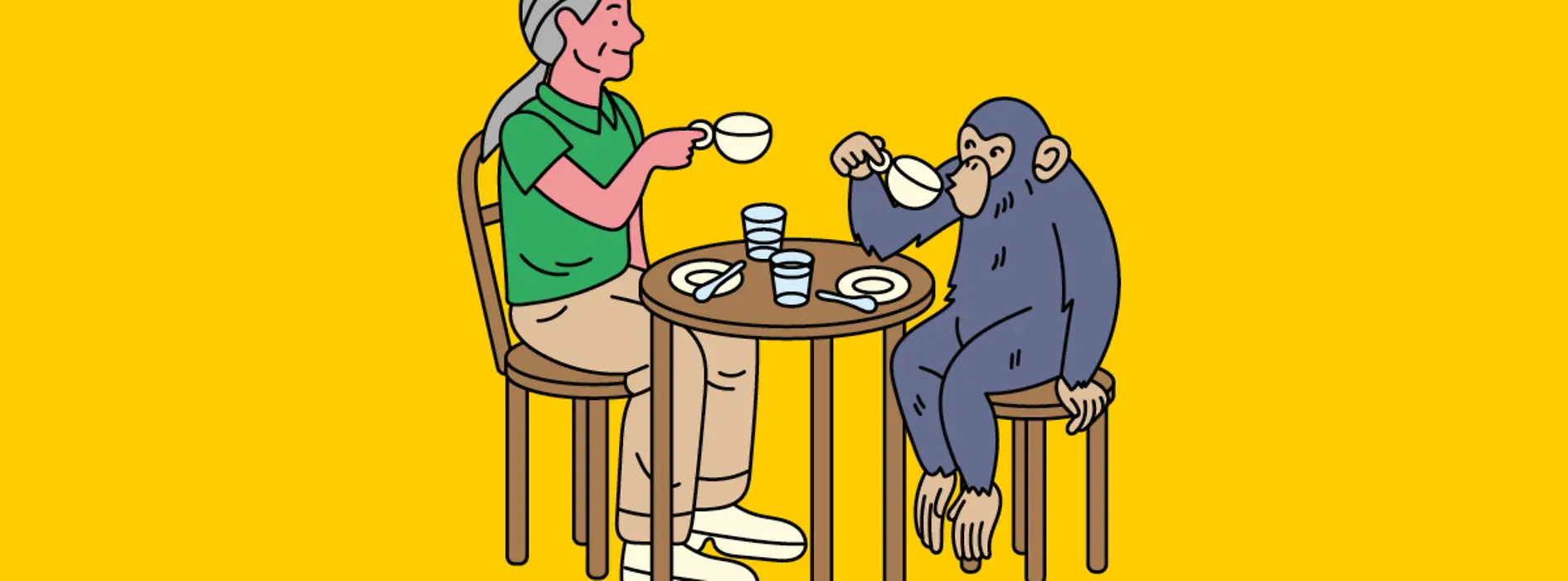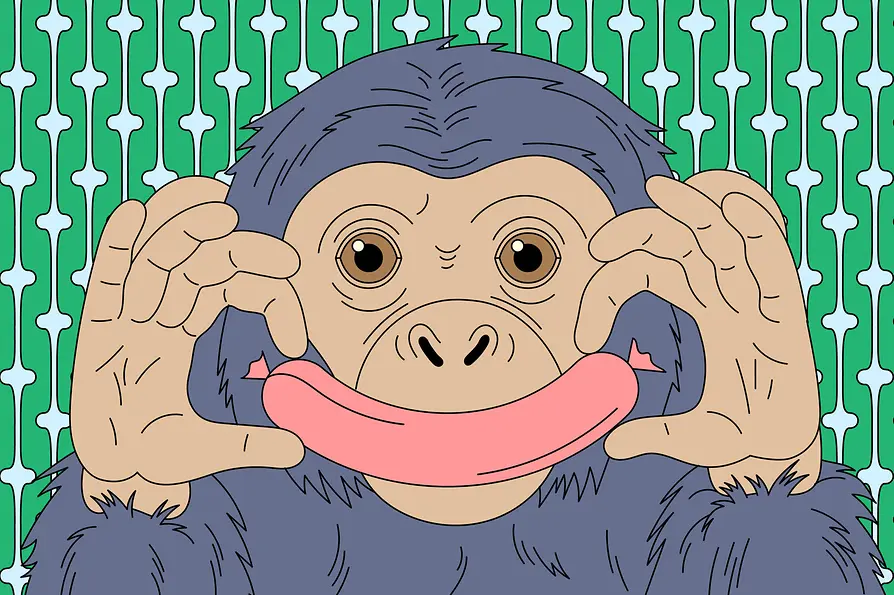Time to Save the World
“Chimpanzees do not deliberately destroy their habitat”
Dame Jane Goodall, started studying chimpanzees in Tanzania 65 years ago. The findings of the British behavioral researcher not only revolutionized the way we look at our closest relatives. They also changed the way we look at the human species. Her work inspired generations of scientists. The 91-year-old is still active today, giving lectures and campaigning for a better world – for apes and humans. For the Vienna Tourist Board, she took the time to talk about why chimpanzees don't live in cities and what we can learn from these intelligent animals.
Chimpanzees do not live in a specific, small area of the rainforest, but in territories ranging from six to 95 square kilometers. As omnivores, they not only hunt, but also actively seek out fruit-bearing trees on a daily basis. The changing availability of food sources at different times of year often forces them to travel long distances through the forest. This is one of the reasons why they do not settle in one place.Chimpanzees and humans are very similar. You once said ‘The only thing that distinguishes us from chimpanzees is language’. They live in groups, make tools, can show emotions, recognize mistakes, can be as vicious as humans. If they are so similar to us: why have chimpanzees never founded cities like humans?
To be honest, I can't really imagine it. But purely in terms of their way of life and their species-specific habits, there would have to be a lot more green spaces, parks with large trees. And these areas should be connected. But just in terms of their way of life and their habits, there would have to be a lot more green spaces, parks with big trees. And these areas should be connected. Not small green islands surrounded by concrete, or just a few shrubs or trees in containers for decoration. Green spaces without barriers that allow wild animals to move from one area to another. No wide roads with heavy traffic that become life-threatening barriers, making it impossible for animals to migrate within their territory and posing a deadly threat. There should be waterholes and places to find food and trees to shelter in.Let's imagine that chimpanzees lived in cities. What would these cities look like, how would they be organized? What would distinguish these settlements from our cities today?
Chimpanzees and humans have common roots in Africa – one reason why my mentor Louis Leakey, who was very interested in the ancestors of modern humans, sent me to Gombe, Tanzania. He wanted to learn more about our evolution, our similarities with chimpanzees, but also our differences. There are so many similarities in our behavior, and you really have to realize that about 99% of our DNA is identical. My observations have taught me a lot about the structures within a group. For example, chimpanzees strengthen their social bonds by grooming each other. This 'grooming' is just one way in which they try to win the favor of their fellow chimpanzees. In this way, they are very similar to us! They also show empathy. The members of the community show solidarity, helpfulness and care towards the members of their group. Today I often notice that many people lack empathy. More solidarity, mutual understanding and actions that have a lasting positive impact on the lives of many would be so important. But there is another aspect we should learn from chimpanzees: they do not deliberately destroy their habitat.Humans are descended from apes and some of our behavior may go back to these primitive times. Is there anything we humans can learn from chimpanzees when it comes to living together?
I think it depends very much on the individual and how each person lives their life, what their work situation is like and all the factors that make up our daily lives. There are definitely advantages. But as an environmental activist, as an ambassador for peace, and as a 91-year-old woman who has seen a lot of changes over the last few decades, I am very critical of some developments. We have to think about the enormous energy consumption, the environmental problems, the waste, but also the way in which the anonymity of life in big cities affects the psyche of many people. There are many social problems. Many people lack a connection to nature and an understanding of the relationship between ecology and economy, between people, animals and the environment. Your assessment as a behavioral scientist: is living in cities the best option for humans in terms of civilization?
Without a doubt: nature!Where do you personally feel more comfortable? In nature or in cities?
It is so important to finally understand that a sustainable and resource-efficient lifestyle is necessary for our survival. The overexploitation of our planet and the ruthlessness of nature for the sake of profit and the selfish behavior of some in power, but also the ignorance, disrespect and lack of knowledge of many people, make it difficult. It is of the utmost importance to stop the destruction of habitats and to preserve ecosystems – for our future and for future generations! What can humans learn from chimpanzees when it comes to preserving their habitat – and why do we apparently fail to do so?
We must work to protect their habitat and put an end to the trade and abuse of wild animals. Not only chimpanzees, but other great apes and animals are threatened with extinction because of hunting. It is estimated that the trade in exotic animals is the fourth most lucrative after the illegal trade in drugs, weapons and people. It is a multi-billion-dollar-business that is driving the extinction of species and the destruction of nature. How important it would be to work to preserve habitats and protect species! We should always remember that when we destroy an animal's habitat, we destroy the very basis of our existence. We all share these unique ecosystems and need them to live and survive – whether it is the rainforest, the oceans and freshwater areas, the soil, or all those areas that we see individually but are so far away. Everything on this planet is connected!What can we humans do to offer chimpanzees a prosperous future?
Absolutely. It is not too late and I am not giving up hope! I am relentlessly appealing to all generations! There is still a window of opportunity for change, however small it may be. But it is there and we must not lose hope! We see and know that, despite everything, there are many developments in the right direction. We are considered to be the most intelligent species, we have more technological possibilities than ever before, and we can connect with people around the world in an instant. So many people around the world are committed to living together peacefully and protecting their environment. In my travels I see thousands of children and young people who have tremendous strength and great projects. But I also see adults standing by their side and taking action. Each of us can decide every day what kind of impact we want to have on our environment. All these positive movements are counteracting the negative developments and that gives me hope.What’s your message to the world and especially young people, when you think of the need to organize our life in a more sustainable way? Is it still a message of hope?
Interview: Robert Seydel


